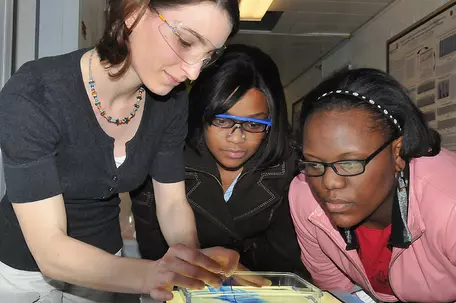Advising
Why Advising Matters

Advisors can play an important role in checking that basic skills are being supported and to help students strengthen these skills if needed. In addition, advisors can play a crucial role in building community. To strengthen this component, it may also be helpful to have a second advisor, who is different than the academic advisor, who can just check in with how students are doing in getting their needs met. In addition, advising can help build community for students of all backgrounds and can help students find STEM classes that fit their needs.
Example Academic Support Center Programs
University of California Berkeley - The Educational Opportunity Program provides first generation and low-income college students the guidance and resources necessary to succeed at Berkeley. In place for over 40 years, program success is documented through data on student grades, graduation, and number of contacts.
Richland College, Dallas, Texas - The services provided by Richland's Advising Center are geared toward student needs. For example, students meet with faculty advisors at the Advising Center, which is easier for students and less intimidating than meeting in a faculty member's office. The Center employes faculty members as well as a full-time staff of professional academic advisors. A useful tool for students is the Advising Syllabus which explains what academic advising is, outlines expectations for advisees and advisors, provides a directory of tools & resources, and identifies different advising methods that are available.
Example Faculty Advising Programs
St. Olaf College - The Academic Advising Center supports both advisors and advisees by providing resources and tools to smooth the advising path. For advisors, the Tools for Academic Advisors page provides a host of practical tips and information needed to advise students.
Additional Resources
InTeGrate: Support the Whole Student
The "Support the Whole Student" page from the InTeGrate project offers a gateway to information related to supporting students through building community, instilling motivation to succeed, advising and mentoring, and more. It also provides an overview of what it means to support the whole student.
SAGE 2YC: Supporting Student Success
This suite of web pages from Supporting and Advancing Geoscience Education in Two-year Colleges (SAGE 2YC) addresses the particular issues and concerns of supporting students at or from two-year colleges. The site tackles issues of Stereotype Threat and Solo Status, supporting English Language Learners and First Generation Students, and empowering students, among other topics.
Program Descriptions from InTeGrate
Explore examples of programs from a variety of institutions across the US that were successful in their efforts to attract and support diverse students learning about the Earth. Each program description offers a glimpse at keys to their success, how they attract new students and support their majors, and how they prepare their students for the workforce.
Making Use of Mentors - from the National Institute for Faculty Equity, this site offers resources that support mentors, including finding mentors as well as tips for being a good mentor for students.
Resources from Outside of SERC-hosted Projects
NACADA (National organization for academic advising housed at KSU) This site includes a resource library that could be helpful for finding research articles about academic advising.
Roles of Students and Academic Advisors, from University of Southern Maine. See also Student Success.
With an Eye Toward Retention, Colleges Ramp up Advising, from the Chronicle of Higher Education.
Advising main page from Richland College, Dallas, Texas, and links in left-hand nav, including Advising Syllabus. See also, article in Chronicle of Higher Ed.; A Revolution in Academic Advising at Texas Community College.
Links to 21 Institutions with Peer Advising Programs
Educational Opportunity Program, from UC Berkeley.
Academic Advising Center, from St. Olaf College. Find information and tools for both advisors and advisees. Links to peer mentoring site (Piper Center) and Tools for Academic Advisors.
Resources for Advising At-Risk Students, from NACADA, a list of advising strategies for at-risk students from NACADA (scroll down halfway)




